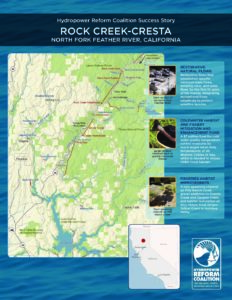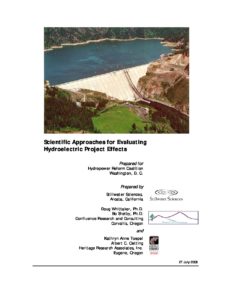Groups Seek to Improve the Hydropower Licensing Process, Restore Authority to Native American Tribes
Press Release
Proposed package will support river conversation, hydropower development and expand authority for Tribal Nations
Contact: LeRoy Coleman, National Hydropower Association, 202-413-4605
Amy Souers Kober, American Rivers, 503-708-1145
Washington, D.C. (April 4) – Conservation organizations, hydropower industry groups, and Tribes today sent a package to Congress and the White House to improve hydropower licensing, relicensing and license surrender processes. Specifically, the package proposes amendments to the Federal Power Act to enhance cooperation, improve clarity, restore autonomy and self-determination for Tribal Nations, and retain states’ decision-making authority. In doing so, the package would help address climate change, better protect the health of the nation’s rivers, and provide Tribes long-sought authority over their lands and waters.
The package is supported by American Rivers, National Hydropower Association, Skokomish Tribe, Upper Skagit Indian Tribe, Midwest Alliance of Sovereign Tribes, Lac Courte Oreilles Band of Lake Superior Chippewa, Union of Concerned Scientists, Hydropower Reform Coalition, California Outdoors, Friends of the River, California Sportfishing Protection Alliance, American Whitewater, New England FLOW, Idaho Rivers United, Foothill Conservancy, Gravity Renewables, Rye Development, Natel Energy, and Nelson Energy.
The Federal Power Act (FPA), enacted in 1920, authorizes the Federal Energy Regulatory Commission (FERC) to issue licenses to build, operate, maintain and remove dams. The proposed updates would significantly improve cooperation among FERC and resource agencies in the hydropower licensing process.
Proposed changes include:
- Improving coordination between FERC, federally recognized Tribal Nations and resource agencies in the hydropower licensing, relicensing and license surrender processes
- Expanding the authority of federally recognized Tribal Nations to protect their lands, waters, other resources and treaty-protected rights
- Addressing climate change in the hydropower relicensing process
- Improving the processes for surrendering licenses and removing non-operating dams
- Providing opportunities to expedite licensing for powering existing non-powered dams and building closed-loop pumped storage hydropower projects
- Improving the evaluation of projects during the licensing process
Click here for an expanded summary of proposed changes.
“This is a package of smart, strategic updates to make the process work better for everyone,” said Tom Kiernan, President of American Rivers. “Healthy rivers are essential to all life. By improving the process for licensing, relicensing and decommissioning dams, and by restoring autonomy and self-determination to Tribal Nations, we will improve outcomes for rivers and communities nationwide.”
“Hydropower is critical to achieving the goal of a reliable, zero-carbon electricity grid, and this package would strengthen the licensing process, improve environmental outcomes and restore authority to Tribal Nations” said Malcolm Woolf, CEO & President of the National Hydropower Association. “The existing regulatory process is unnecessarily time consuming and expensive. With this proposal, we can enhance collaboration, efficiency and better decision making, and we urge Congress to pass this much needed reform.”
“This proposed package is an important next step in recognizing Tribal sovereignty over Tribal lands, and trust resources,” said Mary Pavel, partner at the firm Sonosky, Chambers, Sachse, Endreson & Perry, LLP and former staff director of the Senate Indian Affairs Committee. “Indian Reservations and Tribal trust resources have unduly borne the burden of hydroelectric power development in this Country, and this package would give Tribes a true seat at the table to ensure that this does not continue to happen.”
The Uncommon Dialogue on hydropower and river conservation was convened in 2018 by Stanford University’s Woods Institute for the Environment and Steyer-Taylor Center for Energy Policy and Finance and also the Energy Futures Initiative. This package represents the third agreement by a subset of the Uncommon Dialogue parties. In October 2020, a subset of Uncommon Dialogue parties came together to issue a joint statement and commit to working on the “3Rs” of the nation’s more than 90,000 dams: rehabilitate some for safety, retrofit some for power, and remove some for conservation. In April 2021 another subset of Uncommon Dialogue parties joined in an effort that resulted in more than $2.3B for the “3Rs” in the federal bipartisan infrastructure bill.
“It is gratifying to see this coalition take yet another step in advancing climate, conservation and Tribal imperatives involving thousands of the nation’s dams,” said Dan Reicher, Senior Scholar at the Stanford Woods Institute for the Environment and former U.S. Assistant Secretary of Energy, who initiated this Uncommon Dialogue.
###


